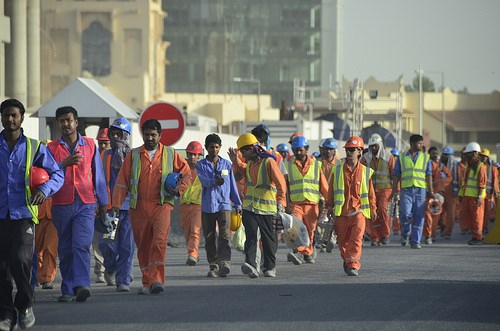Human Rights Watch fear for the construction workers for Qatar 2022
In a report released tuesday, Human Rights Watch finds that hundreds of thousands of migrant construction workers coming to Qatar to work on stadium and infrastructure projects for the 2022 World Cup may risk serious exploitation and abuse, sometimes even amounting to forced labor.
The report, “Building a Better World Cup: Protecting Migrant Workers in Qatar Ahead of FIFA 2022,” has examined the recruitment and employment system in Qatar and found that it effectively traps many migrant workers in their jobs.
The organisation urges both FIFA and Qatar’s government to make sure that worker’s rights in preparation of the 2022 World Cup are respected and maintained and suggest that construction contracts should make specific commitments to uphold international labour standards.
The problems that migrant workers in Qatar face include steep recruitment fees which might take years to pay off, routine confiscation of passports by employers, illegal salary deductions, unsafe working conditions, and Qatar’s restrictive sponsorship system meaning that workers cannot change jobs at any time without their employer’s permission.
In May, Deputy Labor Minister Hussein al-Mulla announced that Qatar may replace the sponsorship system with contracts between employers and employees.
“Workers building stadiums won’t benefit from Qatar’s general promise to end the sponsorship system: they need a deadline for this to happen before their work for the FIFA games starts,” said Sarah Leah Whitson, Middle East director at Human Rights Watch.
“The government needs to ensure that the cutting edge, high-tech stadiums it’s planning to build for World Cup fans are not built on the backs of abused and exploited workers.”
In a letter to Human Rights Watch, Labor Ministry officials stated that “the Ministry has received no complaint of forced labor and it is inconceivable that such a thing exists in Qatar, as the worker may break his contract and return to his country whenever he wishes and the employer cannot force him to remain in the country against his will.”
Migrant workers comprise 94 percent of Qatar’s workforce and the Human Rights Watch report suggests that the country may recruit as much as one million additional migrant workers for the 2022 World Cup preparations.
Read the report here
James Dorsey has also addressed this issue on his blog ‘The Turbulent World of Middle East Soccer’
Read an article from Doha News regarding the Human Rights Watch report here
Source: Human Rights Watch






